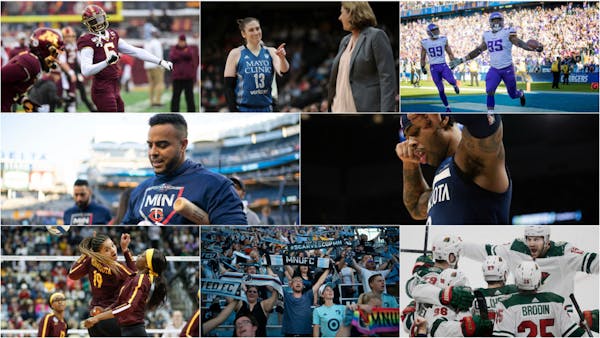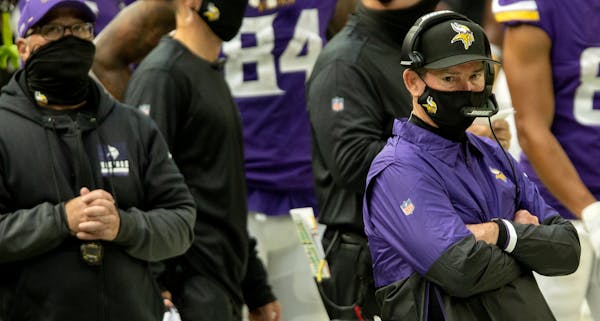By Sunday afternoon, at the conclusion of the Vikings' third game, they will know with some degree of certainty whether the ceiling on their 2020 season is as high as they believed it to be.
They spoke this offseason of "getting over the hump" after an NFC divisional playoff loss to the 49ers and framed the expected departure of five key players on defense as something that would not keep them from competing through the changes.
"You're always going to have an evolution of the roster, and we knew going into this year there were going to [be] some changes," General Manager Rick Spielman said in his most recent news conference Aug. 3. "The point of emphasis was getting a lot of these young guys in and Coach Zimmer and his staff coming up with a great plan. We're going to have a lot of these young guys step up and compete. I know we're going to go through some growing pains here, but just having full belief in Coach Zim and the coaching staff on developing these guys, and the formula has worked."
Two lopsided losses later, the Vikings are effectively fighting for their playoff lives Sunday against the Titans.
They have run just five offensive plays with a lead this season, struggling to put together drives after scoring to start both games and showing little of the stability they expected to have from an offense that brought back nine starters. Their defense has allowed 288 yards and three touchdowns in two second quarters that have effectively made Dalvin Cook an accessory. Even after 24 fourth-quarter points against Green Bay in Week 1, the Vikings have been outscored by 26 in their first two games — more than every team in the franchise's 60-year history except the 2001 club that lost its first two games by a combined 40 points.
Since the NFL expanded to 12 playoff teams in 1990, only four of 146 teams that started 0-3 have reached the postseason. The league's decision to expand to 14 playoff teams this year gives more hope to slow starters, but not much; just four other teams have finished 9-7 after losing three straight to start the year, and only 10 more reached 8-8. Teams have averaged a 5-11 record after starting 0-3 since 1990s.
If the Vikings were to lose Sunday, they'd have to prove they're a rare team to overcome a three-loss start to reach the postseason. They'd have to prove they were correct about that series of assumptions they made at the beginning of the year.
To analyze what's happened to the Vikings, here's a closer look at those assumptions, what's happened to each one and what the Vikings need to do to correct them:
1. Kirk Cousins would improve as he got more comfortable in the offensive scheme.
Days after Kevin Stefanski became the Browns' head coach, the Vikings named Gary Kubiak their offensive coordinator with the goal of keeping together the scheme that helped Cousins post one of his best statistical seasons and a wild-card playoff win in 2019. In February, three weeks before signing Cousins to a three-year, $96 million extension, Spielman said: "I do think he's right now in the prime of his career. I think him being under a system for two years in a row is also going to benefit him."
What's happened: Cousins has completed only 58.8% of his passes and thrown four interceptions (including one on a Hail Mary at the end of the first half last week) after throwing just six all of last year. He's been sacked for safeties in back-to-back weeks, and by most advanced metrics, he's been one of the five least efficient quarterbacks.
What has to change: Cousins talked before the season about how an effective running game made things easier for him in 2019, and the Vikings could put Cousins in more advantageous down-and-distance situations. They've needed at least 7 yards for a first down on 11 of their 15 third downs. But the quarterback might simply need to be more assertive and accurate; his third interception last Sunday, for example, was thrown behind Bisi Johnson.
2. Despite trading Stefon Diggs, the Vikings had plenty of receiver options.
Adam Thielen was recovered from a hamstring injury that limited him for nearly two months last season. The Vikings used the first-rounder they acquired for Diggs to make Justin Jefferson the 22nd overall pick in a deep receiver draft, and signed Tajae Sharpe to a one-year deal. "With the addition of Sharpe, and Adam, and now Jefferson, I think we are going to have a pretty good crew," Spielman said after the first round of the draft April 23.
What's happened: Cousins has targeted Thielen with 16 of his 51 passes; no other receiver has more than seven targets. Second-year tight end Irv Smith Jr. has two catches for 14 yards and had a particularly rough day Sunday, committing two penalties and failing to complete a tough leaping catch for a big gain. Jefferson has five catches (but only one in a first half) for 70 yards.
What has to change: Kubiak said Thursday he thinks the Vikings "are bringing Justin along correctly," saying it's "a lot to ask of a young kid very quickly" to expect him to be a key receiver but adding that Jefferson probably would play a bigger role as the season goes on. The coordinator put much of the onus on himself, saying, "I think when you look at things and say, 'Well, we ran this route — did [Cousins] have a place to go with the ball? It's third-and-6: we ran this route, did he miss somebody or did we not have a place to go with the ball?' As a coordinator, when you're looking at those things and you feel like, 'Hey, the kid had no place to go here or something,' hell, that's personal. I've got to find some ways to get people open for him so he can make those plays."
3. Stability on offense would help the Vikings weather their transition on defense.
The Vikings' changes on defense figured to be more difficult because the coronavirus pandemic canceled offseason programs, shortened training camps and eliminated preseason games. But the team pointed to its stability on offense as an advantage some teams would not have. "We're not starting from ground zero," tight end Kyle Rudolph said in training camp. "It's important for us as an offense. Now we're able to kind of hone in on details of Gary's scheme and things that we can build on from last year."
What's happened: The Vikings have held the ball for a league-low 40 minutes, 19 seconds in two games, running only 96 plays while giving their defense few opportunities for a break. Their 33.3 third-down conversion percentage ranks 29th in the league.
What has to change: It would help the Vikings to start fewer drives backed up against their own goal line. Both of the safeties they've given up have come after goal-line stands, but their average drive has started 78.4 yards from the goal line — the farthest in the NFL. A team that wants to run the ball consistently needs to find room for Cook to work behind a makeshift offensive interior. The Vikings need to re-establish the play-action passing game that Cousins used to great effect a year ago.
4. Even though the Vikings would be young at cornerback, one of the league's best safety tandems would help make it easier to develop.
Sources said the Vikings entertained thoughts of trading Anthony Harris after deciding to place the franchise tag on him, but the team warmed to the idea of keeping Harris with Harrison Smith to ease the transition for a young group of corners. "Ant and Harry, having them back there, it's great," rookie cornerback Jeff Gladney said in training camp. "Through the whole play, they're getting their calls, giving you tips, telling you things you might not think about, just from their experience. With them back there, it's a whole different game. It makes it way easier for a rookie."
What's happened: Coach Mike Zimmer said he kept Smith and Harris in two-deep coverage more often Sunday "because I didn't want the ball going over our head," but the Vikings' young corners still had their issues. Gladney, Holton Hill and Mike Hughes were flagged for illegal-contact penalties against the Colts, and when the Vikings kept a safety closer to the line of scrimmage against the Packers, Aaron Rodgers targeted corners in single coverage for a number of big plays.
What has to change: The Vikings have often played young corners such as Trae Waynes and Mackensie Alexander sparingly in their first seasons, but they've got little choice this year with injuries to rookie Cameron Dantzler and Hughes already thinning their cornerback group. Zimmer, who has prided himself on his ability to develop corners, is in the midst of quite a challenge right now.
5. The Vikings could retool their defense on the fly and remain competitive.
In his season-ending news conference Jan. 13, Zimmer signaled what was coming for the Vikings defense when he said, "At the end of the day, it's a young man's game." Defensive end Everson Griffen opted out of his contract in February; the Vikings released cornerback Xavier Rhodes and defensive tackle Linval Joseph in March, while letting Waynes and Alexander leave in free agency. The team's set of top-heavy contracts kept it from signing a veteran cornerback in free agency, but the Vikings added former Ravens nose tackle Michael Pierce while drafting Gladney and Dantzler in the first three rounds. Before the season, the Vikings challenged the notion that all those changes would lead to a drop-off in performance. "I didn't know we were supposed to be bad," Smith said in August. "So yeah, I guess that motivates me."
What's happened: Pierce, who is a diabetic, opting out of the season because of coronavirus concerns has left the Vikings without a run-stuffing nose tackle, while Danielle Hunter's neck injury meant the team started the season without its best pass rusher opposite new defensive end Yannick Ngakoue. Those losses, coupled with the growing pains of the young corners, have left the Vikings at the mercy of steady running games and veteran quarterbacks.
What has to change: The Vikings could get Hunter back as soon as Week 4, but they'll have to adapt their blitz packages the rest of the season with linebacker Anthony Barr out because of a torn pectoral muscle. They could also help themselves by cutting down on self-inflicted issues such as missed tackles, offsides penalties and infractions in the secondary.
"I probably misjudged the defense a little bit with all the new guys," Zimmer told Tennessee reporters on Wednesday. "We've just made too many mistakes."


